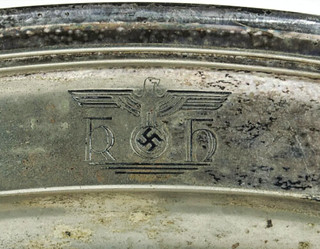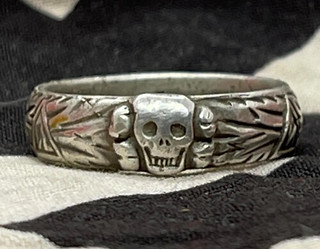
PREV ARTICLE
NEXT ARTICLE
FULL ISSUE
PREV FULL ISSUE
COLLECTING NAZI MEMORABILIAIn the collectors-gonna-collect department, a Friday New York Times opinion piece asks, "What Kind of Person Has a Closet Full of Nazi Memorabilia?" We all know one kind - the collector. Here's a spotty excerpt, which can't do justice to the complete article available online. -Editor
For a while I shadowed a tall, affable dealer from Belgium who specialized in badges and who'd already spent nearly all of the $100,000 in cash he'd brought with him. He stopped at one table and efficiently inspected a couple of dozen Nazi-era Iron Crosses, whispering to me which were fake or had been modified, before settling on one he liked, or at least thought worth the $500 he paid for it. I'd gone to the Show of Shows, the largest military memorabilia show in the country, because I wanted to better understand the trade in Nazi artifacts, to try to get a sense of these collectors, their motivations. For years I've seen up close the pull Nazi artifacts can exert. I've spent time with Polish treasure hunters seeking, and occasionally finding, any variety of objects left behind by the Nazis. But I hadn't understood how pervasive the trade was — hadn't understood, in fact, that it was a trade, how thoroughly these artifacts had been commodified. And I certainly hadn't realized how the big the market was here, in the United States.
What opened my eyes was learning how much Nazi stuff there was on LiveAuctioneers, the pre-eminent online platform for antiques dealers. According to a Times Opinion analysis, the site has published more than 30,000 listings for Nazi memorabilia in the past 15 years, making it probably the biggest, and certainly the most mainstream, purveyor of Nazi artifacts in the country. Although LiveAuctioneers' policy prohibits
This is a valid and justifiable response — it's an excellent rule of thumb, to be on the side that's against Nazis — but at the same time it strikes me as incomplete. It does not reckon with who the collectors are or why they collect nor does it address the principles the market is built on, or what it in fact espouses. The truth is that many collectors of Nazi memorabilia are, in fact, collectors, a term I'm using semi-technically to describe those who dedicate themselves, often obsessively and for reasons inscrutable to the outsider, to amassing some or other class of objects, usually something interestingly varied in terms of condition, provenance and rareness — action figures, stamps, coins, Pez dispensers. This isn't to say there's never a profit motive, but there is, or at least at some point was, a base desire on the part of collectors to, simply, possess.
There are collectors of Nazi memorabilia who are Jewish, whose relatives died in the Holocaust. None were eager to speak with me on the record — not because they thought they were doing anything shameful but because, as one told me,
One collector I spoke to explained it in terms of
To read the complete article, see:
Wayne Homren, Editor The Numismatic Bibliomania Society is a non-profit organization promoting numismatic literature. See our web site at coinbooks.org. To submit items for publication in The E-Sylum, write to the Editor at this address: whomren@gmail.com To subscribe go to: https://my.binhost.com/lists/listinfo/esylum All Rights Reserved. NBS Home Page Contact the NBS webmaster 
|


